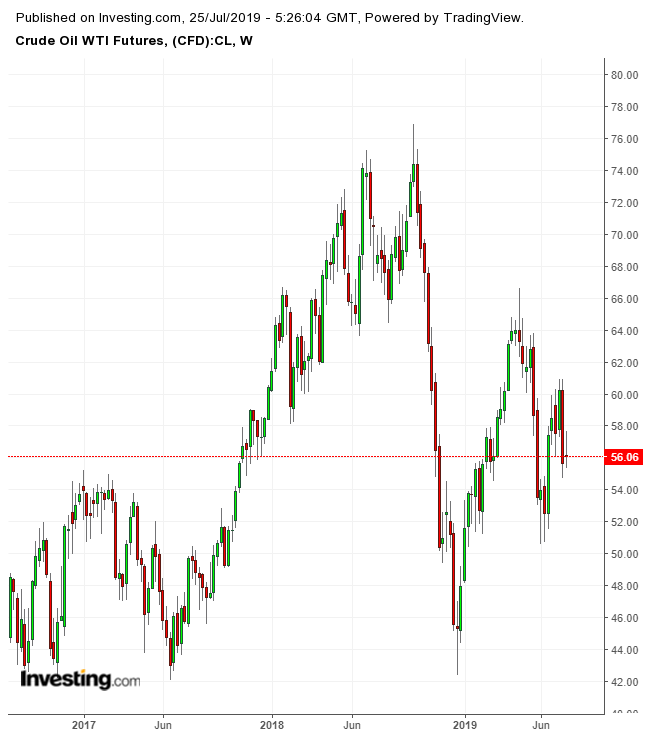When a Swedish-owned tanker sailing through the Strait of Hormuz under the British flag was commandeered by Iranian Revolutionary Guard Corp forces early this week, oil prices only rose a paltry 1.1%. This is not the first time oil markets have essentially ignored threats to oil distribution in the Persian Gulf this spring and summer. As oil prices continue to shrug off rising geopolitical tensions in the epicenter of the Middle-Eastern oil trade, traders want to know if and when it will start to impact the markets.

Why aren’t oil prices reacting to the real and growing threat that the Iranian military poses to the safe and free passage of oil tankers through the Strait of Hormuz? Several factors are involved.
1. Weakening Oil Demand Ahead
Signs that the demand for oil will weaken in the future are mounting and are playing a crucial role in keeping oil prices depressed in the market today. Macroeconomic indicators and a lack of optimism that the trade war between the U.S. and China will be resolved are major factors driving market sentiment now and outweighing concerns that the supply of oil from the Middle East could be disrupted.
2. Flow Of Crude Unaffected So Far
Iran hasn’t actually done anything (yet) that has impeded or threatened crude oil exports. None of the sabotaged tankers in June were carrying crude oil and the tanker seized earlier this week was empty. Very often when an incident is first reported it appears as though crude oil has actually been affected, but thanks to specialists like TankerTrackers.com who are able to keep close watch on the area, the facts and truth has been disseminated quickly so that traders and market watchers understand that the flow of crude oil has not been disrupted. Despite the nefarious intentions out of Iran, the ability to track oil shipments today by third parties has provided vital and calming information to traders.
3. Geopolitical Risk Already Priced In
Geopolitical risk has already been priced into the oil market. This became clear last week when oil prices actually dropped after it was reported that the Trump administration and Iran might engage in a diplomatic process. That news was subsequently quickly refuted and prices again rose, demonstrating that the market already priced in this type of geopolitical risk in the Middle East, and only a drop in tension would require an adjustment in the market.
4. Growing U.S. Oil Production
U.S. oil production is a significant force in the market. The United States is producingaround 12 million barrels per day of oil and is now exporting growing amounts of that oil to customers who are purchasing it to replace some Middle East oil. Weekly EIA data on U.S. oil production, storage, exports and use has been having a much more significant affect on prices than any geopolitical event in the Persian Gulf. American oil production and exports help keep a lid on prices despite the sanctions on Iran or the Iranian threat to oil shipments in the Gulf.
How long can these four factors keep oil prices down if Iranian aggression continues or even escalates? It depends.
A sustained rise in prices now might require the situations to change in more than one of the points listed above. If, for example, negotiations between the U.S. and China show promise and tariffs on Iran are eased in addition to some sort of bottleneck in the U.S. oil industry (a pipeline or port closure, for example), then we would likely see oil prices rise and remain elevated.
It is also possible that Iran could drastically escalate its attacks, leading to a new paradigm in which the market must change its expectations with higher prices. If Iran caused serious damage to (or sank) a tanker carrying crude oil, or caused an oil spill in the Gulf, we would likely see oil prices rise and stay elevated as long as the threat remained. This level of attack and disruption is not currently priced into the market, because most analysts believe that Iran is not self-destructive and does not want to destroy the Persian Gulf environment.
Traders who believe the regime in Iran is constrained by its own survival interests should be wary of predictions for these Persian Gulf tensions to have a serious impact on pricing. Those who think the Iranian regime is entirely unpredictable and perhaps erratic or irrational may expect an unforeseen drastic escalation that would end the status quo.
 By Ellen Wald, PhD – Jul 25, 2019
By Ellen Wald, PhD – Jul 25, 2019
Source: Investing.com
